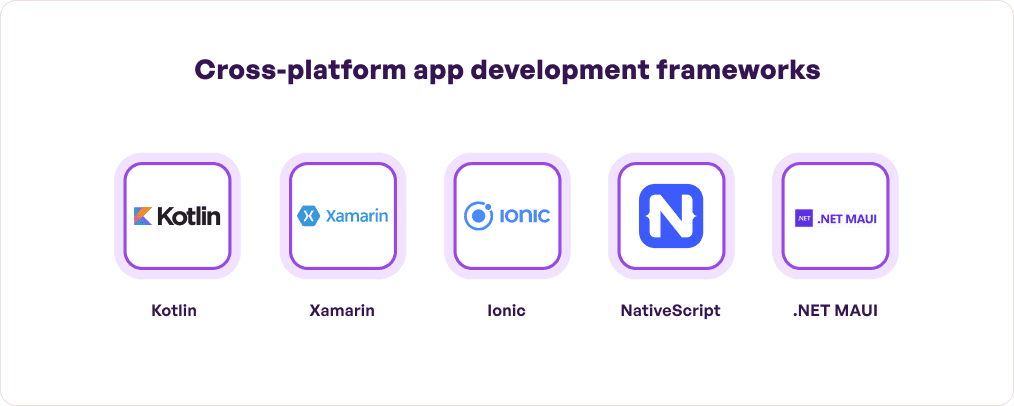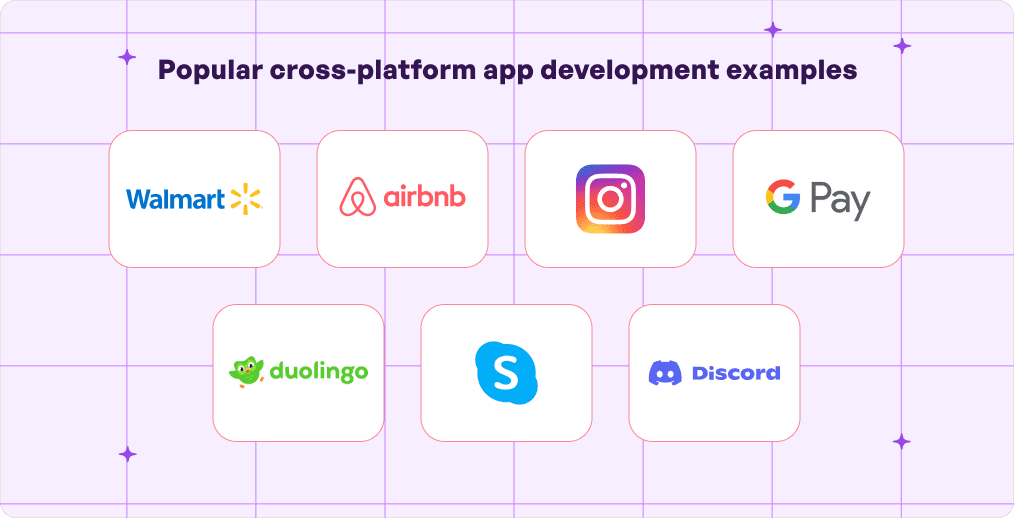In recent years, the world has witnessed a significant shift in how software is developed and delivered. One of the most prominent trends in this regard is the rise of cross platform app development which allows developers to build apps that run on multiple platforms, such as Android, iOS, and Windows, using a single codebase. Such an approach ensures faster delivery and reduced development costs for businesses.
These have been possible with the advent of powerful frameworks like React Native and Flutter which has allowed developers to create apps with consistent user experiences across several platforms. Below are a few more:
 The frameworks provide pre-built components and libraries that expedite development while promising a native-like performance. Additionally, a simplified maintenance process results in cost savings and time efficiency for both businesses and developers. So, it is no surprise that the global cross platform app development framework market size is poised to reach $546.7 billion by the end of 2033 growing at a 16.7% CAGR from 2023.
The frameworks provide pre-built components and libraries that expedite development while promising a native-like performance. Additionally, a simplified maintenance process results in cost savings and time efficiency for both businesses and developers. So, it is no surprise that the global cross platform app development framework market size is poised to reach $546.7 billion by the end of 2033 growing at a 16.7% CAGR from 2023.
The availability of skilled developers proficient in various programming languages has a key role in fueling cross platform app development. At Simublade, our professionals are experts at building cross-platform solutions to help your business reach maximum user base with minimal investment. Our mobile app development company realizes the inherent advantages of mastering multiple programming languages and thus works with a wide range of the same along with several frameworks so there is an ideal fit for every project.
Table of contents
7 applications of cross platform app development
It is safe to say that the rise of cross platform app development has significantly revolutionized the software industry by enabling businesses to create versatile and efficient applications that cater to diverse user bases. Let’s see a few examples.

1. Walmart
Walmart is one of the biggest American multi-channel retailers running a chain of hypermarkets offering fresh dairy and bakery products, home furnishing, electronics, toys, and groceries. It can be considered as an extremely successful cross platform app development case study Walmart was initially struggling with a crowded interface and slow loading time. However, integrating React Native into its mobile app development process was a complete game-changer since the app started offering better navigation, excellent UI experience and fast loading.
This was possible since React Native supports live and hot reloading which can patch a code without having to recompile the entire application. Further, it enables the seamless integration of the Walmart app across multiple platforms like iOS and Android using a unified codebase and by utilizing technology, software frameworks, and tools that allow for the creation of applications that run smoothly on various devices and operating systems.
In short, Walmart has revolutionized the retail sector by embracing React Native, empowering users with a sophisticated and user-friendly app. This has solidified the brand’s position as a driving force of innovation and it currently ranks #1 in the Fortune Global 500 list of top-selling brands in the world for the last 10 years as of 2023.
2. Airbnb
Airbnb, a trailblazer in the travel and accommodation industry, has revolutionized the way people find and book lodging around the world. One key factor contributing to Airbnb’s immense success is its adoption of cross platform app development using React Native as the core framework in its tech stack, back in 2016.
With this, Airbnb is able to offer a seamless user experience on both iOS and Android devices. The decision to use a single codebase for both platforms enabled code reusability, leading to reduced development time and faster time-to-market for new features and updates like photo and video authentication. This approach has enhanced user satisfaction and allowed Airbnb to efficiently experiment and iterate on its app, making a noteworthy mark in the industry. Here’s proof: reports found that Airbnb revenue for the quarter ending in March 31, 2024 stood at $2.142 billion which is a 17.82% Y-O-Y increase.
Additionally, the cost-effectiveness of cross platform app development allowed Airbnb to allocate resources to other critical areas of the business, which led to:
- ensuring user satisfaction in terms of payment and customer service.
- driving its global expansion in countries like Brazil and Japan
In short, Airbnb’s strategic implementation of React Native exemplified the potential of the frameworks to foster innovation, scalability, and business effectiveness in the highly competitive mobile app landscape.
3. Instagram
Instagram, the social media giant that has transformed the way we share and connect and has a remarkable win-win story of cross platform app development. Initially available only on iOS in 2010, Instagram recognised the importance of reaching Android users to expand its user base. Embracing React Native, an open-source framework by Facebook, Instagram embarked on a cross-platform journey. By leveraging React Native, Instagram achieved several advantages. Here’s a look:
- the app could maintain a consistent user interface and experience on both iOS and Android devices for a seamless transition for users across platforms.
- faster development cycles and code reusability were made possible since developers could write code once and deploy it on all platforms, streamlining the development process and reducing time-to-market for new functionalities.
- cost savings was another major benefit of adopting cross platform app development since creating separate native apps for iOS and Android is resource-intensive, requiring distinct development teams. React Native’s single codebase approach maximized development resources and reduced overall costs for the company.
All of these factors combined, it was found that Instagram’s ad revenue was expected to reach $30.14 billion in 2024 alone and it is likely to account for a whopping 49.9% of Meta’s total revenue by 2025.
4. Google Pay
Google Pay, one of the leading mobile payment apps facilitating a quick and secure way of sending money to friends and purchasing online or in stores, migrated to Flutter in 2019. This investment proved extremely successful since it saved Google a huge chunk of capital that would otherwise be required for rewriting the whole app for different platforms. Below are the additional benefits :
- the new codebase was of 1.1 million lines instead of 1.7 million lines on Android and iOS separately which saved 60-70% of the developers’ time.
- the overall effort was 1.2 times instead of double effort for building native apps.
- strong security patches and audits were in place which are of primary importance in financial apps to gain the trust of users.
- a fresh interface was built keeping the initial features intact.
- enabled fast and resource-efficient scaling of Google Pay was possible and the app was launched in India and the US on Flutter codebase. As of June 24, 2024, Google Pay is further simplifying payment by shutting its services in the US and launching Google Wallet.
These efforts were a success since in 2024, Google Pay’s adoption in the US market was remarkably higher than in early 2020 which points at a growing usage rate.
5. Duolingo
Duolingo, the widely acclaimed fun language learning platform is a remarkable example of a flourishing cross platform app development process. From its inception, Duolingo aimed to make 40+ language learning accessible to users worldwide with bite-sized lessons, regardless of their device’s operating system. To achieve this vision, Duolingo strategically embraced cross platform app development, using a combination of robust technologies, including Flutter and React Native.
By leveraging them, Duolingo significantly reduced development time and allowed for simultaneous updates and feature rollouts, enabling a seamless and consistent learning experience for users across devices. The choice of cross platform app development also enhanced user engagement since with a unified interface on both iOS and Android, learners could seamlessly transition between devices, picking up their language lessons from where they left off without confusions.
This continuity played a pivotal role in motivating learners and fostering a habit of regular language practice. Moreover, Duolingo’s cross-platform approach supported its global expansion efforts and now stands at $27million net worth in Q1 2024 which highlights the effectiveness of its operational efficiency. As the platform reached new international markets, its compatibility with diverse devices facilitated widespread broader adoption, helping Duolingo build a vast and diverse user base worldwide.
6. Skype
The popular video and voice calling service Skype understood how crucial it was to provide unified communication experiences across a range of devices and operating systems. So, Skype chose to use Xamarin, a powerful framework made up of C# and .NET that enables the production of a unified app for both the iOS and Android platforms.
By utilizing Xamarin, Skype was able to accomplish code reuse, enabling programmers to share a sizable amount of the codebase between the two platforms. This method allowed for quick updates and feature releases, ensuring that users across both platforms could access the most recent communication functions. By embracing cross platform app development, Skype strategically chose to expand its audience – there are more than 300 million monthly active users and the app accounts for 40% of all international voice traffic. It also gained a diverse global user base across 170 countries by providing dependable and feature-rich software on both main platforms, cutting beyond geographical and device-related obstacles.
7. Discord
Discord, a popular communication platform for gamers and communities, has gained recognition for its strategy of developing apps across different platforms. By using cross-platform development frameworks like Electron and React Native, Discord could reuse code which simplified the development process. This approach enabled the development team to work on both the iOS and Android versions simultaneously, resulting in :
- faster updates
- introduction of new features.
As a result, Discord users across different platforms could enjoy a consistent and seamless communication experience. Additionally, cross platform app development technologies empowered Discord to build a strong community.
Gamers and communities worldwide could communicate easily regardless of the devices they used, breaking down barriers and connecting users with different preferences and operating systems. Discord’s cross-platform approach also played a pivotal role in its global expansion and ensured a whopping $575 million revenue in 2023 alone and is expected to grow rapidly in the coming years. As the app entered new international markets, its compatibility with various platforms allowed for broader adoption and growth, strengthening its position as a leading communication platform.
Thus Companies like Airbnb, Instagram, Google Pay, and Discord, and various others have successfully leveraged this approach to enhance user experiences, reduce development time, and lower costs. As technology continues to evolve, cross platform app development will likely remain a prominent trend for businesses seeking to stay ahead in an increasingly competitive digital landscape.
Conclusion
In conclusion, the rise of cross platform app development has transformed the way businesses develop apps in today’s fast-paced digital world. By leveraging powerful frameworks and adopting a single codebase approach, developers can create seamless applications that cater to various platforms without compromising on quality or performance. As technology continues to progress, it would not be surprising to see cross platform app development becoming the norm for businesses worldwide.
At Simublade, a pioneering mobile app development company in Texas, USA, we are renowned for our comprehensive range of services. From web design and web development to app development, we have made a significant impact in the tech industry. Our process extends beyond traditional app development, as we specialize in cross platform app development, showcasing our commitment to innovative and versatile solutions.
By harnessing the power of cross-platform technologies, we enable clients to reach a wider audience while maintaining a consistent user experience across multiple platforms.





